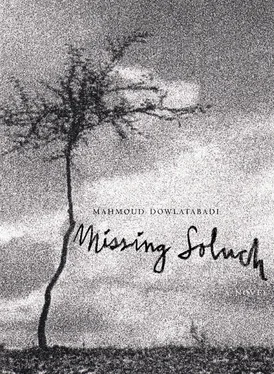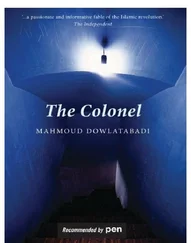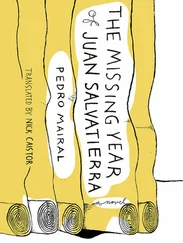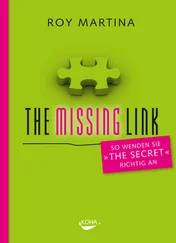The kinds of jobs that Abrau knew about could be counted on the fingers of his two hands. And the places outside the village that he knew of were also just as few. Setting aside the seasonal work in the fields, Abrau had heard that some years back the young and old men of Zaminej used to go for work on the road line. These were the years during which the road from Tehran to Mashhad was being rebuilt. He had heard much about this. But he couldn’t imagine what this road line looked like. It was just a name in his head. He knew that in the summers, especially in years when the harvest was bad, the skilled harvesters would go out toward Ghuchan for work and each would return to Zaminej with ten or twenty man of wheat, storing it in their storehouses to make morning bread for their children. But this was all he was aware of when it came to the kinds of work that were available outside of the area. Morad, the son of Sanam, wasn’t so friendly with Abrau to have told him what sort of work he did outside of Zaminej. If pressed, he would just say, “It’s a wide world outside. Out there, a man can always make a living.” That’s all he’d say.
Once, when Abrau was a small child, perhaps even before he wore pants, one of those “city-room” minibuses showed up to transport pilgrims from Zaminej. The children gathered around the machine and looked at its windows, tires, and seats with eyes wide with amazement — their jaws simply fell open! Pilgrims from three villages in the area had collectively rented the bus to take them to the city of Mashhad and back. Just seeing that bus opened vistas in Abrau’s imagination. For the first time, he realized that people could travel with something other than an animal and that it was possible to go very great distances with a vehicle such as this. Places far, far away. After that, Abrau had grown used to seeing automobiles, but seeing these had not affected him as much as that first experience had. Abrau thought to himself that Soluch was not the kind to travel in a car. More likely he’d gone by foot. But where and how far could one go traveling by foot? And how far are feet willing to travel if being directed by an empty belly? What if he had fallen while trying to make his way through the snow and ice? What if wolves had tracked and circled him? And if vultures had hovered in circles above him? Abrau had heard that vultures would first peck out the eyes of a corpse. The shepherds of Zaminej used to tell stories of vultures that would descend on sheep that had fallen, plucking out the eyes of the carrion before beginning to disembowel it. Each vulture had to be about the size of a house’s roof archway. They would cover the carrion like a tent casting shadows over the body. What a terrifying sight! They could frighten someone to death if he wasn’t dead already. Could he imagine Soluch resorting to begging, given his sense of honor? Could he even consider for a moment that Soluch might steal a cup or a water jug from the front door of someone’s house? That Soluch could even stretch out his hand so as to take what was not his? Was it possible? No! Abrau would sooner die than to accept such a thing. No! Soluch, his own father, would never steal or resort to begging. Abrau could never think of Soluch in that way. Soluch was a man with strong arms and broad shoulders, not a wolf with sharp nails and teeth.
“Hayyu ala al-salat … Hayyu ala al-salat …”
The glassy air of the dawn was broken by the call to prayer by the Molla of Zaminej.
Ali Genav’s kettle had begun to boil. Abrau didn’t know where the tea was. Ali Genav turned over in his place, grumbling and swearing under his breath. He directed his anger at the Molla for waking him, despite the fact that it was clear that the call to prayer was to mark the death of Ali Genav’s mother, calling the people to join a funerary prayer that morning. They had agreed to this the night before; it was the Molla himself who had suggested they leave the body in the mosque overnight. He had no choice; Ali Genav had to get up. He turned over again, scratched his side, and then opened his heavy, tired eyelids.
Abrau asked, “Where is your bag of tea?”
“It’s hanging on that nail. Just look there, you’ll see it.”
Abrau busied himself with making tea. Ali Genav stretched, pounded his chest with his fists, and yawned like a camel, bringing himself over to the fire. Abrau poured tea and he quickly downed four cups before saying, “I have to go and tend to the burial, God have mercy on her soul.”
He rose and placed his cloak over his shoulders. He handed the long key to the door of the public baths to Abrau, saying, “Open your eyes and ears! Other than the farmers, who pay me by barter, everyone else pays in cash. Adults pay three qerans ; the children pay thirty shahis . Don’t let anyone try to fool you! Let’s see how you do today. And when you leave, latch and chain the door. Those sons of bitches, as soon as they see I’m gone, they try to get in here to set up a gambling session. Since the water boiler’s warm, they like it here.”
Abrau listened idly to what Ali Genav was saying, but he wasn’t following him closely. He knew more or less what he was saying. But his thoughts were far from this place and these matters. They were lost in other places. Places that were alien to him. He just knew that they were far from here. Confusing, confounding places that pulled Abrau in like a tiny speck lost in a vast sea. Abrau’s mind had been brought to a standstill; he had no power over it. He stared intensely at the ashes in the fireplace, his thoughts fixed on something that words could not express. For a moment, it was as if he had retreated from the world entirely. He was light, empty, free of burden.
Ali Genav threw a quick glance at the bony shoulders of the child and then bent over to exit the room.
The morning air was freezing. Ali Genav tied the ends of his scarf around his chin and then climbed up the steep hill in front of him. The pool was frozen over. The call to prayer still echoed in the air. A streak of smoke tainted the pure dawn sky. “What does he want to prove? It’s enough! God damn your prayers — everyone’s heard you by now. They’ll come out of their homes in small groups shortly, of course they will! Ha! See how he drags out the call!”
“Aren’t you going in the wrong direction? Who’s to open the bathhouse then?”
It was Karbalai-Safi, the father of the Kadkhoda. He had his bath supplies under one arm and was leaving his house with some difficulty. Ali Genav greeted him and said, “Mergan’s son will be there, Karbalai. He has the key.”
Karbalai-Safi tucked his chin in and headed for the baths. Ali Genav turned the corner and went straight to Mergan’s house. The stove in her house was already lit and a pillar of smoke filled the house’s doorway. He looked inside and said, “Where is that son of yours, Abbas?”
She looked up from the oven and looked at him with watery eyes. She lifted the edge of her scarf before her nostrils and asked, “What do you want him for?”
“I want to take him to help me dig the grave.”
“He’s had an upset stomach since last night. I don’t know. He’s still in the stable right now.”
Ali Genav turned to look at the stable door. The door swung open on its hinges with a dry and old-sounding creak, and Abbas stood in the doorway. He had one hand on the wall and the other propped up against the door. He looked as if he would collapse if he let go of either. His eyes were sunken into their sockets, looking like two watermelon seeds. His cheeks were puffed and his skin was as yellow as hay.
Ali Genav went to him and said, “So what happened to you? I was going to take you to the graveyard with me!”
Abbas could hardly make a sound. He whispered with great difficulty, “I’m sick … Really, I’m in a bad way … I’m really sick.”
Читать дальше












